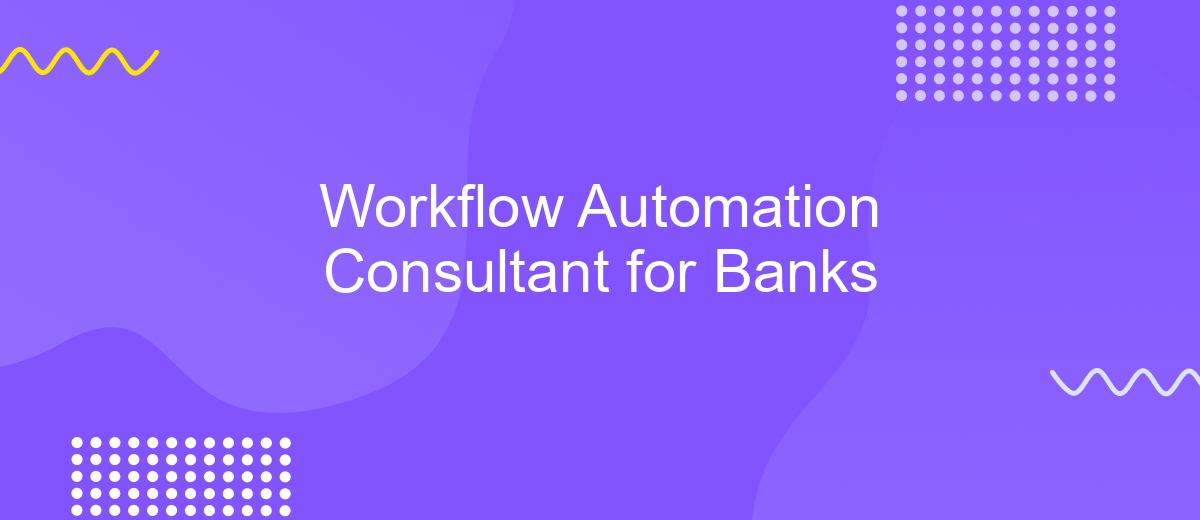Workflow Automation Consultant for Banks
In today's rapidly evolving financial landscape, banks face increasing pressure to streamline operations and enhance efficiency. A Workflow Automation Consultant for Banks plays a crucial role in this transformation by leveraging cutting-edge technologies to optimize workflows, reduce manual processes, and improve service delivery. This article explores the key responsibilities, benefits, and impact of workflow automation consultants in the banking sector.
Introduction
In the rapidly evolving financial sector, banks are increasingly turning to workflow automation to streamline operations and improve efficiency. A Workflow Automation Consultant plays a crucial role in this transformation, guiding institutions through the complexities of automating their processes. By leveraging advanced technologies, these consultants help banks reduce manual tasks, minimize errors, and enhance overall productivity.
- Identifying key areas for automation
- Designing tailored automation strategies
- Implementing cutting-edge tools and platforms
- Ensuring seamless integration with existing systems
- Providing ongoing support and optimization
One notable tool that facilitates seamless integration is ApiX-Drive, which enables banks to connect various applications without the need for extensive coding. By utilizing services like ApiX-Drive, Workflow Automation Consultants can ensure that the automation solutions are both effective and scalable, ultimately driving significant improvements in operational efficiency and customer satisfaction. As banks continue to adopt automation, the role of these consultants becomes increasingly vital.
Role and Responsibilities

A Workflow Automation Consultant for Banks is responsible for analyzing and optimizing the bank's operational processes to enhance efficiency and reduce manual labor. They collaborate closely with various departments to identify bottlenecks and implement automated solutions that streamline workflows. This involves conducting thorough assessments of current procedures, designing automation strategies, and ensuring seamless integration with existing systems. The consultant must stay updated on the latest automation technologies and best practices to provide innovative solutions tailored to the bank's unique needs.
Additionally, the consultant manages the implementation of automation tools such as ApiX-Drive, which facilitates the integration of various applications and services. They oversee the configuration and customization of these tools to ensure they meet the bank's specific requirements. Training staff on new systems and providing ongoing support to address any issues or improvements is also a critical part of their role. By leveraging their expertise, the Workflow Automation Consultant helps banks achieve greater operational efficiency, cost savings, and improved customer satisfaction.
Technical Skills and Knowledge

A Workflow Automation Consultant for Banks must possess a robust set of technical skills and knowledge to effectively streamline and optimize banking processes. Their expertise should encompass a wide range of tools and technologies to ensure seamless integration and efficient workflow management.
- Proficiency in workflow automation tools such as UiPath, Blue Prism, and Automation Anywhere.
- Strong understanding of integration platforms like ApiX-Drive for connecting various banking software and services.
- Experience with programming languages and scripting, including Python, Java, and SQL, to customize and enhance automation solutions.
- Knowledge of database management systems such as MySQL, PostgreSQL, and Oracle.
- Familiarity with cloud services like AWS, Azure, and Google Cloud for deploying and managing automated workflows.
- Competence in using BPM (Business Process Management) tools like Camunda and IBM BPM.
- Understanding of cybersecurity principles to ensure data integrity and compliance with banking regulations.
In addition to technical skills, a Workflow Automation Consultant should have a keen eye for detail and strong problem-solving abilities. They must be capable of analyzing complex workflows, identifying inefficiencies, and implementing solutions that enhance productivity and reduce operational costs. Their role is crucial in driving digital transformation within the banking sector, ensuring that processes are not only automated but also optimized for maximum efficiency.
Industry Expertise and Experience

Our team of Workflow Automation Consultants possesses extensive expertise and experience in the banking sector. We understand the unique challenges and regulatory requirements that banks face, and we tailor our solutions to meet these specific needs. Our goal is to streamline operations, enhance efficiency, and ensure compliance with industry standards.
With years of hands-on experience, our consultants have successfully implemented automation solutions for numerous financial institutions. We leverage cutting-edge technologies and best practices to deliver robust and scalable automation frameworks that drive business growth and operational excellence.
- Customized workflow automation strategies
- Integration with existing banking systems
- Regulatory compliance and risk management
- Data security and privacy assurance
- Continuous support and optimization
We also utilize powerful tools like ApiX-Drive to facilitate seamless integration across various platforms and services. This enables banks to automate complex workflows effortlessly, ensuring smooth and efficient operations. Our commitment to excellence and deep industry knowledge make us the ideal partner for any bank looking to embrace workflow automation.
Soft Skills and Business Acumen
As a Workflow Automation Consultant for banks, possessing strong soft skills is crucial. Effective communication, both verbal and written, ensures that complex automation processes are clearly understood by all stakeholders. Active listening is equally important, as it helps to capture client requirements accurately and tailor solutions accordingly. Additionally, problem-solving and critical thinking are essential for identifying inefficiencies and proposing innovative automation strategies that align with the bank's goals.
Business acumen is equally vital in this role. Understanding the banking sector's regulatory environment, financial products, and customer service expectations allows the consultant to design relevant and compliant automation workflows. Familiarity with tools like ApiX-Drive can significantly enhance integration capabilities, enabling seamless data flow between various banking systems and third-party applications. This not only streamlines operations but also ensures that the bank remains competitive in a rapidly evolving market.
FAQ
What is workflow automation in the context of banking?
How can workflow automation benefit banks?
What types of processes in banks are suitable for automation?
How does ApiX-Drive help in workflow automation for banks?
What are the security considerations when implementing workflow automation in banks?
Apix-Drive will help optimize business processes, save you from a lot of routine tasks and unnecessary costs for automation, attracting additional specialists. Try setting up a free test connection with ApiX-Drive and see for yourself. Now you have to think about where to invest the freed time and money!

